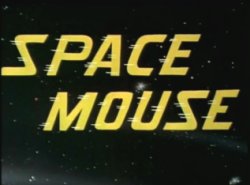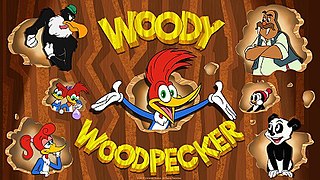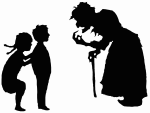
Woody Woodpecker is a cartoon anthropomorphic woodpecker that has appeared in theatrical short films produced by the Walter Lantz Studio and distributed by Universal Studios between 1940 and 1972.

Walter Benjamin Lantz was an American cartoonist, animator, film producer, director and actor best known for founding Walter Lantz Productions and creating Woody Woodpecker.

"Hansel and Gretel" is a German fairy tale collected by the Brothers Grimm and published in 1812 in Grimm's Fairy Tales.

Hansel and Gretel is an opera by nineteenth-century composer Engelbert Humperdinck, who described it as a Märchenoper. The libretto was written by Humperdinck's sister, Adelheid Wette, based on the Grimm brothers' fairy tale "Hansel and Gretel". It is much admired for its folk music-inspired themes, one of the most famous being the "Abendsegen" from act 2.

Chilly Willy is a cartoon character, a diminutive penguin. He was created by director Paul Smith for the Walter Lantz studio in 1953, and developed further by Tex Avery in the two subsequent films following Smith's debut entry. The character soon became the second most popular Lantz/Universal character, behind Woody Woodpecker. Fifty Chilly Willy cartoons were produced between 1953 and 1972.

The New Woody Woodpecker Show is an American animated comedy television series that was based on the animated short film series created by cartoonist and animator Walter Lantz. It was created and developed by animator Bob Jaques, and co-developed by and storyboard artist Kelly Armstrong. Jaques co-directed the first 13 episodes alongside Alan Zaslove, until the 14th episode, where Zaslove becomes the sole director until the show's cancellaction. It was produced by Universal Cartoon Studios and aired from May 8, 1999 until July 27, 2002 on Fox's Fox Kids in the United States.

Chief Charlie Horse is the 68th animated cartoon short subject in the Woody Woodpecker series. Released theatrically on May 7, 1956, the film was produced by Walter Lantz Productions and distributed by Universal International.

Red Riding Hoodlum is the 75th animated cartoon short subject in the Woody Woodpecker series. Released theatrically on February 11, 1957, the film was produced by Walter Lantz Productions and distributed by Universal International. The short is based on the fairy tale Little Red Riding Hood, written by Charles Perrault and the Brothers Grimm.

The Unbearable Salesman is the 77th animated cartoon short subject in the Woody Woodpecker series, with Knothead and Splinter. Released theatrically on June 3, 1957, the film was produced by Walter Lantz Productions and distributed by Universal International.

International Woodpecker is the 78th animated cartoon short subject in the Woody Woodpecker series. Released theatrically on July 1, 1957, the film was produced by Walter Lantz Productions and distributed by Universal International.

Tree's a Crowd is the 87th animated cartoon short subject in the Woody Woodpecker series. Released theatrically on September 8, 1958, the film was produced by Walter Lantz Productions and distributed by Universal International.

Gabby's Diner is the 108th animated cartoon short subject in the Woody Woodpecker series. Released theatrically on March 28, 1961, the film was produced by Walter Lantz Productions and distributed by Universal International.
Hansel and Gretel is a television special that was made in 1983 for The Disney Channel, directed by Tim Burton. It only aired once on October 31, 1983 at 10:30 P.M. The only other times it was shown was as part of the Tim Burton retrospective at the Museum of Modern Art in New York City, and the Tim Burton L'Exposition at the Cinémathèque Française in Paris as part of a traveling exhibit.

The first Space Mouse was a comic book character published from 1953 to around 1956 by Avon Publications. Space Mouse was also the name of a 1959 Universal Studios cartoon featuring two mice and a cat named Hickory, Dickory, and Doc. A second Space Mouse character was published by Dell Comics from 1960 to around 1965. The Dell Comics version was also featured in a 1960 cartoon produced by Walter Lantz, entitled The Secret Weapon.

Woody Woodpecker: Escape from Buzz Buzzard Park is the name of two video games, based on the animated series The New Woody Woodpecker Show, one released for the PlayStation 2 and Windows, and the other for the Game Boy Color.

Hansel & Gretel is a 2013 American horror film produced by The Asylum and directed by Anthony C. Ferrante that stars Dee Wallace, Brent Lydic and Stephanie Greco. While the film is considered a "mockbuster", intended to capitalize on the release of Paramount and MGM's film Hansel & Gretel: Witch Hunters, it is a modern retelling of the Brothers Grimm fairytale of the same name.
The Candy House is a 1934 short animated film by Walter Lantz Productions featuring Oswald the Lucky Rabbit. The film is an adaptation of the fairy tale Hansel and Gretel by the Brothers Grimm, and is one of the few Oswald shorts in which he plays a different character.

Woody Woodpecker is an American animated franchise and series of comedy short films created by Walter Lantz. It was produced by Walter Lantz Productions and distributed by Universal Pictures from 1940 and 1972.

Woody Woodpecker is an American animated web series based on the animated film series and cartoon character of the same name created by Walter Lantz. It premiered on YouTube on December 3, 2018.


















